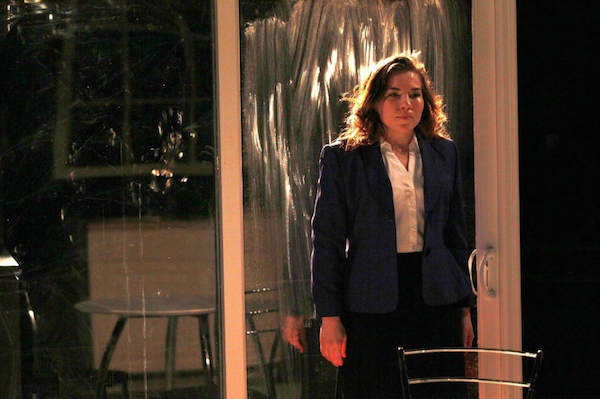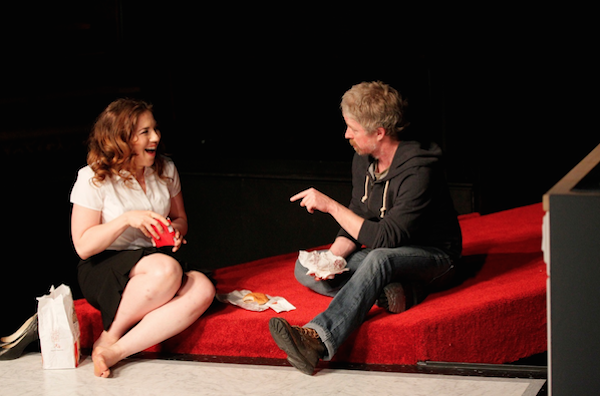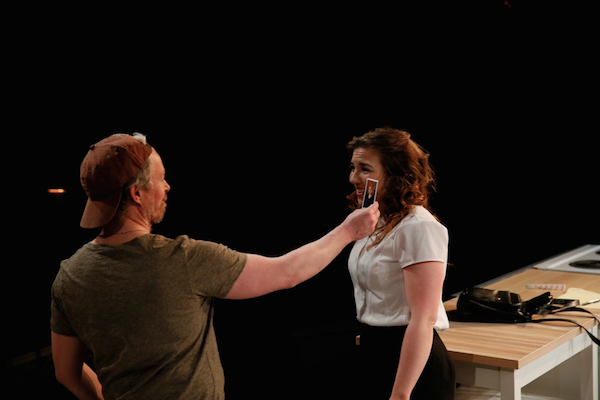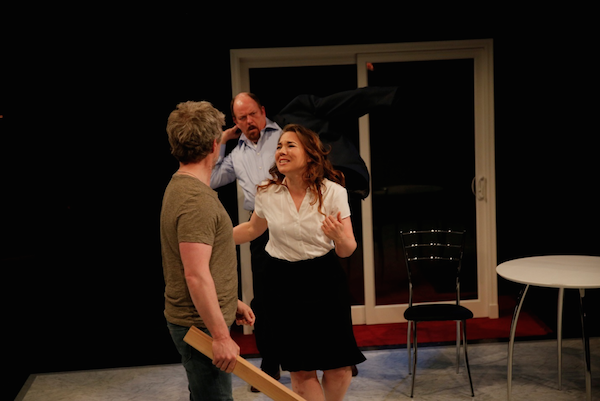
Written by Hannah Hunthausen, Program Assistant, Seattle University’s Faith & Family Homelessness Project
“Fighting to survive doesn’t bring out the best in a person.”
I heard this truism spoken by one of the main characters in the new play Bethany at Seattle’s ACT Theatre on one of the first preview nights, and I saw it play out repeatedly and disturbingly.
I couldn’t help but be reminded of one of my favorite albums, Bruce Springsteen’s Nebraska, in which we see characters’ dreams and spirits consumed by loss of jobs, debt and dignity.
In Bethany, Crystal, our heroine, fits this profile to a T – she’s lost her home and her daughter, and finds herself at the edge of a precipice. We watch as she faces setback after setback and as her desperate struggle to reunite her family – while keeping up appearances – eats away at her hope, judgment and sense of self.

Foreclosing on the American Dream
We meet Crystal as she is breaking into an empty house that is not hers. Though she’s dressed smartly in a business suit for her sales job at the local Saturn dealership, we soon find out that she recently lost her house to foreclosure and has been living out of her car for days. She runs into Gary, an agoraphobic and mentally fragile drifter who’s already squatting in the house. The two form a delicate alliance and support one another as they navigate their otherwise isolating situation.
Framing the action of the play, Charlie, a motivational speaker, peddles a distorted version of the American dream: “There’s a higher power that guides our destiny, and He wants you to be rich!” This crass and deceptive vision of “manifest prosperity,” of security and stuff, reminiscent of Cadillac’s recent ‘Poolside’ ad, lies mockingly out of reach for the main characters, casting their desperation in cruel contrast.
The action centers on Crystal and her unravelling plight to re-establish some stability in her life and regain custody of her five-year-old daughter, Bethany (the absent title character), who was taken away from her when she became homeless. In thrilling dramatic fashion, it all comes down to closing one last big sale.

- Darragh Kennan and Emily Chisholm as Gary and Crystal. Gary holds up a picture of Bethany to Crystal’s face to see the resemblance. Five-year-old Bethany lives with her mother in their car for a time before being taken away.2,709 kindergartners are homeless in Washington state alone, out of a staggering homeless schoolchild population of more than 30,000 in our state. Photo credit: Chris Bennion.
Fragile and Invisible Families
Crystal’s recession story is a reminder of the fragility of so many families in our midst – especially single-parent families.
We don’t know much about Crystal’s previous circumstances. I was frustrated by this at first (at one point, Crystal says simply, “My only problem is that I lost my home,” which clearly doesn’t tell the whole story), but it leads us to imagine the possibilities as well as the special kind of struggle faced by single mothers.
Was she abused or abandoned by a former partner? Divorced? Did a medical problem or emergency drain her resources? She has a job, but she probably experienced a significant salary reduction in an economy where people aren’t buying cars. Any one of these factors could push a single mom into the abyss.
Families like Crystal’s make up a startling portion of America’s homeless population: more than one-third are homeless families, and the majority are female-headed households. These vulnerable families often seem invisible because, like Crystal and her daughter, they may live out of their cars or couch-surf to avoid the dangers of the streets.

Realism and Bad Decisions
So what did I think of Bethany? As the house lights came on, my reaction was mixed.
First, I questioned the realism of a key premise: would a mother really be stripped of custody of her child for being homeless? It turns out that, while unlikely, homelessness might be considered child neglect in and of itself in some states and therefore grounds for taking a child into protective custody or foster care.
On the other hand, Crystal’s struggle to get Bethany back feels real enough. Her interactions with a compassionate state social worker, whose hands are tied, certainly ring true.
Ultimately, I was most shocked and disgusted by the deception and manipulation Crystal resorts to in the end – even to the point of victimizing others. But I had to take a step back. We often hear about people going into “survival mode” when they are pushed into poverty and homelessness. This toxic stress can bring about bad decision-making, ranging from financial mismanagement to criminal activity.
I had to remind myself that Crystal’s actions, while extreme, also come out of this vulnerable place.

A Tale of Extremes
Bethany is a highly dramatized tale of extremes: a fictionalized account not meant to be representative of the millions experiencing homelessness and poverty in our country.
And yet Crystal’s struggles are rooted in reality. She loses her home to foreclosure, just as thousands have in Washington since the beginning of the recession in 2008. She sleeps in her car for a time, like 993 people during the One Night Count in King County this past January. And Crystal faces losing her job when the recession comes knocking at the auto industry’s door.
We see Crystal’s story played out on the stage, but so many others are hidden from public view. They’re members of our community and they need our help. It’s important that we build supportive communities of service providers, policymakers, advocates and members of the faith community who work together.
Go see Bethany and come face to face with the human cost of homelessness.

What Can You Do?
See Bethany at ACT Theatre through May 4. You can buy tickets at a discounted rate using the promotion code STRONG.
Learn more about family homelessness on Seattle University’s Project on Family Homelessness Facebook page and at the Faith & Family Homelessness Project Blog.
Learn more about avoiding foreclosure through Washington’s 2011 Foreclosure Fairness Act, the Foreclosure Fairness Program, and efforts by Columbia Legal Services and Seattle University School of Law’s Foreclosure Mediation Outreach Project.
Watch films that explore these issues, like American Winter, The Line, Inequality for All, A Place at the Table, and Inocente.
Encourage a high-school student to see Bethany and submit an essay about homelessness stereotypes to Firesteel’s Spark Change Essay Contest for High School Students.
Follow these advocates on Twitter: @BuildingChanges @budget_policy @firesteelwa @HDC_SeaKC @LisaGustaveson @chinrichsen_su @wliha @Mb_society
Have you seen Bethany? What did you think?